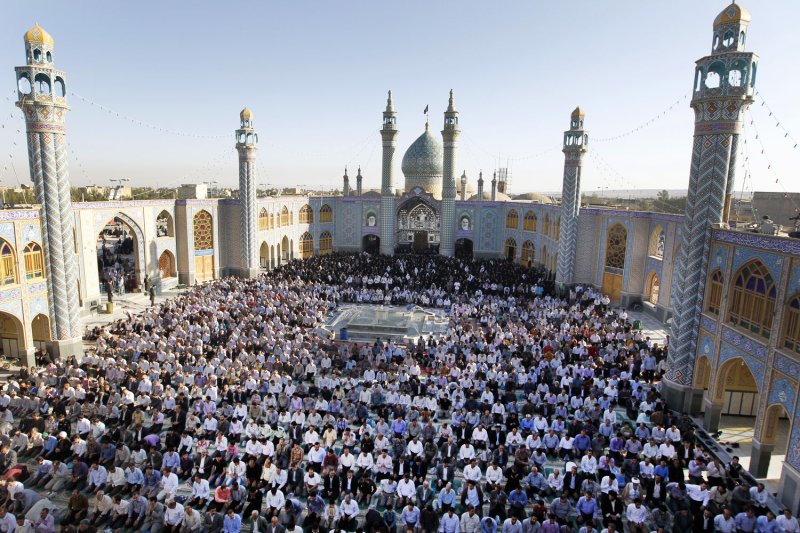1 of 2 | Iranians pray at Imamzadeh Helal-ebne Ali Shrine during Eid-al-Fitr festival in Kashan City, 150 miles south of Tehran, Iran on August 31, 2011. The Eid-al-Fitr festival marks the end of the holy Muslim fasting month of Ramadan. UPI/Maryam Rahmanian |
License Photo
TEHRAN, Sept. 6 (UPI) -- Muslim countries such as Turkey shouldn't serve the interests of the U.S.-European NATO military alliance, a prominent Iranian lawmaker says.
Iranian Member of Parliament Alaeddin Boroujerdi, chairman of the Majlis National Security and Foreign Policy Committee, said Sunday Turkey's announcement it was close to accepting a NATO missile defense shield radar installation was troubling.
"Muslim countries should maintain security in the region through reliance on their capabilities and cooperation and should not allow a situation to develop where insecurity prevails in the region and NATO's interests in the region are served by Muslim countries," Boroujerdi told the state-owned Mehr News Agency.
The Turkish Foreign Ministry revealed Friday negotiations with NATO over an anti-missile shield had reached "their final stages."
"It is anticipated that the early-warning radar system allocated by the United States to NATO will be deployed in our country," Foreign Ministry spokesman Selcuk Unal said in a written statement.
The early-warning radar is part of an anti-ballistic defense system NATO says is aimed at countering security threats posed by rogue states such as Iran and North Korea.
But Iran claims the system merely serves the interests of Israel and thus Muslim countries, such as Turkey, should not agree to be part of it.
"NATO not only does not contribute to regional security but is also a major source of insecurity in the region," Boroujerdi added. "NATO's intervention in Afghanistan and Iraq illustrated the fact that NATO is only pursuing its own interests in the region."
The lawmaker added, "NATO's intervention in Libya also proved that NATO has no respect for Muslim countries."
Late last year when reports of NATO missile defense systems in Turkey first surfaced, Iranian Foreign Ministry spokesman Ramin Mehmanparast blasted it, saying they are solely aimed at defending Israeli interests.
"There are dubious intentions behind the story which raised concerns in regional and Islamic countries," he was quoted as saying by the ISNA news agency. "We are not a threat to regional countries, and the countries in our region, except the Zionist regime, are not a threat to us."
"The measure aims at supporting the Zionist regime and protecting it against its crimes," he added.
The Turkey radar installation is part of NATO's "Strategic Concept," laid out in Lisbon last year, and leans on Turkey for a continuing important role as Iran builds up its strategic missile program.
Last week's announcement by Ankara came after months of negotiations in which Turkey said it would block the anti-missile program if Tehran were specifically named as a threat.
"Mentioning one country, Iran ... is wrong and will not happen," Turkish President Abdullah Gul told the BBC last November. "A particular country will not be targeted. ... We will definitely not accept that."
The Hurriyet Daily News reported Saturday another of Turkey's concerns had to be overcome for the agreement to go forward: Ankara demanded that data collected from the station not be shared with Israel.
The condition came in the wake of Turkey's move last week to suspend military agreements with Israel and downgrade diplomatic relations.
An unnamed Turkish diplomatic source told the newspaper a radar site had already been identified at an unidentified Turkish military installation. Speculation is mounting it will be located either in the eastern province of Malatya or in the southern province of Adana, the newspaper said.





